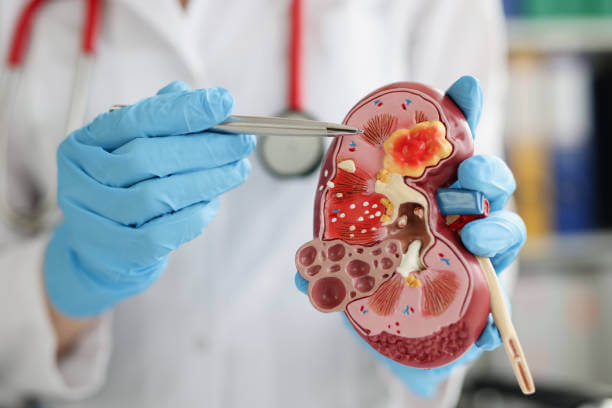Kidney failure is one of the most serious complications associated with diabetes. Diabetes is the leading cause of kidney failure in the United States, accounting for 44% of all new cases. Kidney failure occurs when the kidneys are no longer able to filter wastes from the blood effectively. This can lead to a build-up of toxins in the blood, including a potentially fatal electrolyte imbalance. While there is no cure for kidney failure, early diagnosis and treatment can help to slow its progression and preserve kidney function.
1. Kidney failure is a serious complication of diabetes.
Kidney failure is a serious complication of diabetes and can lead to death. diabetic ketoacidosis (DKA), a life-threatening condition, can cause kidney failure. People with diabetes should know the signs and symptoms of DKA and seek medical help immediately if they experience them. The kidneys are two organs located in the abdomen. They filters wastes from the blood and excrete them in urine. The kidneys also help regulate blood pressure and produce hormones that are essential for making red blood cells. Diabetes can damage the kidneys and cause them to stop working properly. When the kidneys are not working properly, they cannot filter wastes from the blood properly. This can lead to a build-up of wastes in the blood, including ketones. Ketones are acids that are produced when the body breaks down fat for energy. When there are too many ketones in the blood, it is called diabetic ketoacidosis (DKA). DKA is a life-threatening condition that can lead to coma and death.
The signs and symptoms of DKA include:
- Excessive thirst
- Frequent urination
- Nausea and vomiting
- Abdominal pain
- Fatigue
- Difficulty breathing
- Flushed skin
- Fruity-smelling breath – If you have diabetes and experience any of these signs or symptoms, seek medical help immediately. DKA can be treated with insulin and fluids.

2. Kidney failure can occur as a result of both type 1 and type 2 diabetes.
Kidney failure is a serious complication that can occur as a result of both type 1 and type 2 diabetes. When the kidneys are unable to function properly, they are unable to filter waste from the blood, which can lead to a build-up of toxins in the body. This can cause a variety of symptoms, including fatigue, nausea, and shortness of breath. In some cases, kidney failure can be fatal. There are two main types of kidney failure: acute kidney failure and chronic kidney failure. Acute kidney failure occurs when the kidneys suddenly become unable to function properly. This can be caused by a variety of factors, including a sudden loss of blood supply to the kidneys, an infection, or a medication error. Chronic kidney failure, on the other hand, occurs when the kidneys slowly and gradually lose function over time. This is most often caused by a long-term medical condition, such as diabetes. People with diabetes are at an increased risk for developing chronic kidney disease. In fact, according to the National Kidney Foundation, about one in three people with diabetes will develop kidney disease over the course of their lifetime. There are a number of reasons why diabetes can lead to kidney disease. First, high blood sugar levels can damage the blood vessels in the kidneys, which can eventually lead to kidney damage. Additionally, diabetes can also cause high blood pressure, which can further damage the kidneys. If you have diabetes, it’s important to monitor your kidney function closely. This can be done through a simple blood test called a creatinine test. If your creatinine levels are high, it may be an indication that your kidneys are not functioning properly. If you have any concerns about your kidney function, be sure to talk to your doctor.

3. diabetes is the leading cause of kidney failure in the United States.
Diabetes is the leading cause of kidney failure in the United States. According to the American Diabetes Association, more than 30 million people in the United States have diabetes. Of those, only about one in four have been diagnosed. Diabetes can cause kidney failure for a couple of reasons. First, high blood sugar levels can damage the blood vessels in the kidneys. This damage can make it hard for the kidneys to filter out wastes and excess fluids. over time, this can lead to kidney damage or failure. Second, diabetes can cause high blood pressure. This happens when the kidneys have to work harder to filter out the excess sugar in the blood. High blood pressure can damage the blood vessels in the kidneys and lead to kidney damage or failure. If you have diabetes, it’s important to keep your blood sugar levels under control. You can do this by following a healthy diet, getting regular exercise, and taking diabetes medication as prescribed by your doctor. You should also get regular checkups to make sure your kidneys are functioning properly.

4. Kidney failure can lead to a number of other serious health complications.
Kidney failure can have a ripple effect throughout the body, leading to a number of other serious health complications. When the kidneys are not functioning properly, they are unable to filter toxins and waste from the blood. This can lead to an accumulation of toxins in the blood, which can cause damage to other organs. The build-up of toxins in the blood can also cause high blood pressure, which can damage the heart and lead to stroke. In addition, the kidneys are responsible for producing a hormone that helps to regulate blood sugar levels. When they are not functioning properly, blood sugar levels can become erratic, which can lead to diabetes. Kidney failure can also cause anemia, which is a condition in which the blood is unable to carry enough oxygen to the body’s tissues. This can lead to fatigue, shortness of breath, and an increased risk of infection. If left untreated, kidney failure can be fatal. It is therefore important to seek medical help if you think you may have kidney failure.

5. Early diagnosis and treatment of diabetes can help to prevent kidney failure.
It is estimated that 30-40% of all cases of kidney failure are caused by diabetes. This is because diabetes can cause damage to the blood vessels in the kidneys, which can lead to kidney disease. If kidney disease is not treated early, it can progress to kidney failure. There are two types of diabetes, type 1 and type 2. Type 1 diabetes is usually diagnosed in childhood or adolescence, and type 2 diabetes is usually diagnosed in adulthood. Both types of diabetes can cause kidney failure, but type 2 diabetes is more likely to do so. If you have diabetes, it is important to see your doctor regularly so that they can monitor your kidney function. If they notice any signs of kidney disease, they can treat it early to help prevent it from progressing to kidney failure. There are many things you can do to help prevent diabetes-related kidney failure. These include: -Keeping your blood sugar levels under control. This can be done by following a healthy diet, maintaining a healthy weight, and taking medication if prescribed by your doctor. -Exercising regularly. -Quitting smoking. -Monitoring your blood pressure. If you have diabetes, it is important to follow these tips to help prevent kidney failure. Early diagnosis and treatment of diabetes can help to prevent kidney failure, so if you have diabetes, be sure to see your doctor regularly.

6. There are a number of things that people with diabetes can do to help protect their kidneys.
There are a number of things people with diabetes can do to help protect their kidneys. One is to control their blood sugar levels. This can be done through diet, exercise, and medication. People with diabetes should also monitor their blood pressure, as high blood pressure can damage the kidneys. Another way to protect the kidneys is to avoid or limit the use of certain medications, such as NSAIDs. People with diabetes should also get regular medical care so that any early signs of kidney damage can be detected and treated.
7. Kidney failure is a serious and potentially life-threatening complication of diabetes.
Kidney failure is a serious and potentially life-threatening complication of diabetes. Symptoms of kidney failure include fatigue, nausea, vomiting, and confusion. If left untreated, kidney failure can lead to coma and death. Kidney failure occurs when the kidneys are no longer able to filter waste from the blood. Diabetes is the leading cause of kidney failure in the United States. People with diabetes are at a higher risk for kidney failure because of the damage high blood sugar can cause to the kidneys. Kidney failure can be treated with dialysis or a kidney transplant. Dialysis is a treatment that filters waste from the blood. A kidney transplant is a surgery to replace a damaged kidney with a healthy kidney from a donor. If you have diabetes, it is important to control your blood sugar and blood pressure. high blood sugar and high blood pressure can damage the kidneys. You should also see your doctor regularly to check your kidney function. If you have kidney failure, it is important to follow your treatment plan. Kidney failure can be a life-threatening condition, but it can be managed with treatment.
Although diabetes is a leading cause of kidney failure, it can be prevented. People with diabetes can lower their risk of kidney failure by keeping their blood sugar and blood pressure under control.
Frequently-asked Questions about ‘Can Diabetes Cause Kidney Failure’:
Q: Can diabetes cause kidney failure?
A: Yes, diabetes can lead to kidney failure. It is one of the most common causes of kidney failure, known as diabetic nephropathy or diabetic kidney disease.
Q: How does diabetes cause kidney failure?
A: Diabetes can damage the small blood vessels in the kidneys over time. High levels of blood sugar can cause the kidneys to filter too much blood, leading to strain and eventually causing the kidneys to fail.
Q: What are the risk factors for developing kidney failure in diabetes?
A: The risk factors for kidney failure in diabetes include poorly controlled blood sugar levels, high blood pressure (hypertension), smoking, genetics, and having diabetes for a long duration.
Q: Can all people with diabetes develop kidney failure?
A: No, not everyone with diabetes will develop kidney failure. However, individuals with poorly controlled diabetes and other risk factors mentioned above are at a higher risk.
Q: How can I reduce the risk of kidney failure if I have diabetes?
A: To reduce the risk of kidney failure, it is important to manage your diabetes effectively. This includes keeping your blood sugar levels within the target range, maintaining a healthy blood pressure, adopting a healthy diet, engaging in regular physical activity, and avoiding smoking.
Q: What are the symptoms of kidney failure in diabetes?
A: In the early stages, kidney failure may not cause noticeable symptoms. However, as it progresses, symptoms can include fatigue, swelling in the legs or ankles (edema), persistent itching, changes in urination patterns (increased or decreased frequency, foamy urine), loss of appetite, nausea, and difficulty concentrating.
Q: How is kidney failure diagnosed in diabetes?
A: Kidney function can be assessed through blood and urine tests. These tests measure the levels of creatinine, a waste product, in the blood and check for the presence of protein (albumin) in the urine.
Q: Can kidney failure be treated if caused by diabetes?
A: While kidney failure caused by diabetes cannot be reversed, its progression can be slowed down or managed through various treatments. These may include medications to control blood pressure and blood sugar, dietary changes, and, in severe cases, dialysis or kidney transplantation.
Q: Can kidney failure be prevented in diabetes?
A: With proper management of diabetes and related risk factors, the risk of developing kidney failure can be significantly reduced. Regular monitoring, lifestyle modifications, and following healthcare provider’s recommendations can help prevent or delay the onset of kidney failure.
It’s important to note that these questions and answers provide general information and should not replace the advice of a medical professional. If you have concerns about diabetes and kidney health, it’s best to consult with your healthcare provider for personalized guidance.

